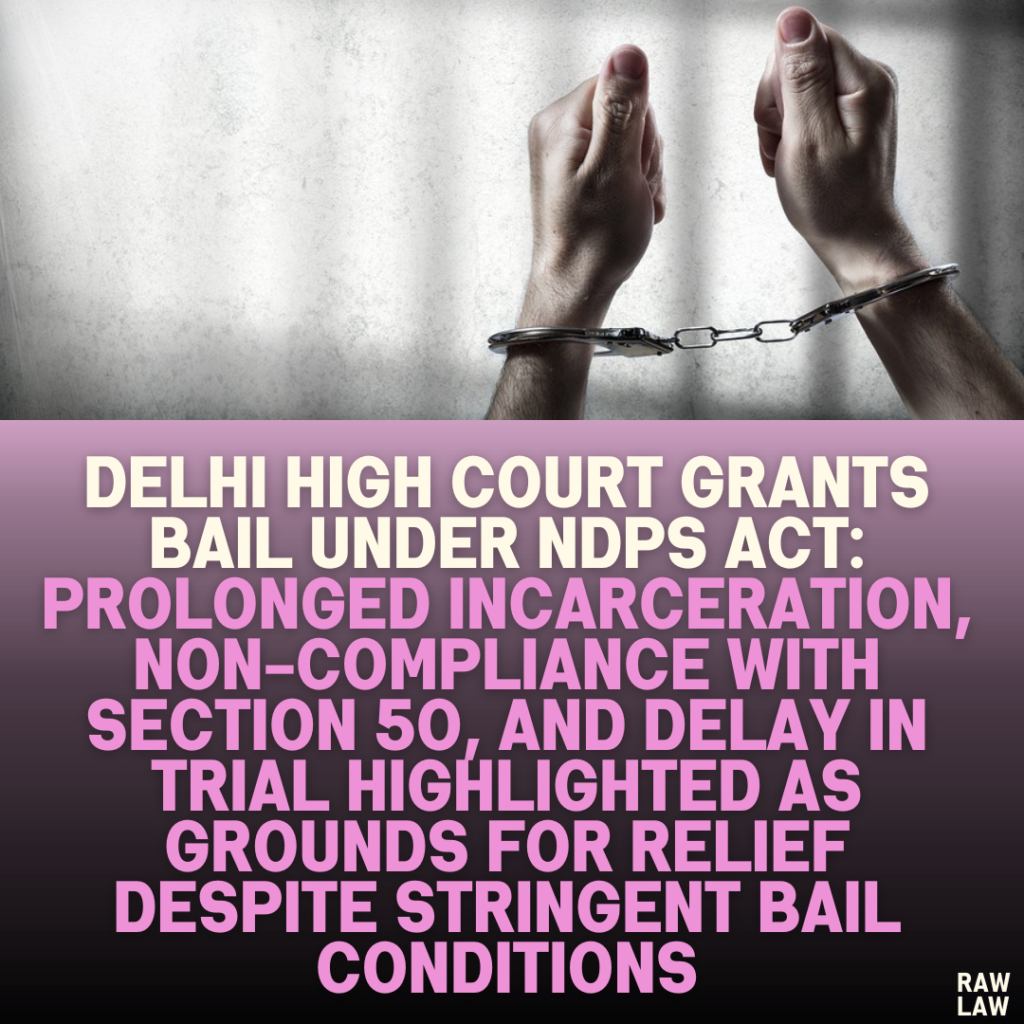Court’s Decision
The Delhi High Court granted bail to the petitioner who was accused under the NDPS Act, citing:
- Prolonged incarceration of over 2.5 years without trial progress.
- Non-compliance with procedural safeguards during the investigation.
- The constitutional right to a speedy trial guaranteed by Article 21 of the Constitution was prioritized over the stringent bail conditions under Section 37 of the NDPS Act.
The court concluded that these factors justified the petitioner’s release on bail, despite the commercial quantity of contraband involved.
Facts of the Case
- The Raid: Acting on a tip-off, law enforcement intercepted a vehicle near Dhaula Kuan in New Delhi, allegedly transporting opium and heroin.
- Seizure and Arrest:
- 2.615 kg of opium was recovered from the petitioner.
- The petitioner and two co-accused were arrested on July 18, 2022, and charges were framed under Sections 18, 25, and 29 of the NDPS Act.
- Trial Delays:
- Despite citing 22 witnesses, the prosecution had not examined any witness as of the hearing date.
- The petitioner remained in custody for over 2.5 years without substantial progress in the trial.
Issues Raised
- Was the non-compliance with procedural safeguards under the NDPS Act significant enough to justify bail?
- Did the long delay in trial and extended incarceration of the petitioner violate constitutional protections?
Petitioner’s Arguments
The petitioner’s counsel presented several points challenging the investigation and trial process:
- Non-compliance with Section 50:
- The notice served under Section 50 of the NDPS Act used the term “any Gazetted Officer” instead of the “nearest Gazetted Officer,” allegedly violating mandatory procedural safeguards.
- Delay in Sending Samples:
- Samples of the seized contraband were sent to the forensic laboratory 13 days after the seizure, violating the 72-hour timeframe prescribed in Standing Order 1/88.
- Absence of Independent Witnesses:
- The search and seizure occurred in a public area, but no independent witnesses were involved, raising questions about the credibility of the investigation.
- Long Incarceration:
- The petitioner had been in custody for over 2.5 years, and the trial showed no signs of concluding soon, violating their right to a speedy trial under Article 21.
Respondent’s Arguments
The prosecution opposed bail on the following grounds:
- Stringent Conditions under Section 37:
- The NDPS Act imposes strict bail conditions for offenses involving commercial quantities of contraband.
- Procedural Compliance:
- The notice under Section 50 informed the petitioner of their rights, and minor deviations did not invalidate the process.
- Delay in Sending Samples:
- Procedural lapses like delayed sample submission were argued to be non-fatal to the case.
- Independent Witnesses Not Mandatory:
- Efforts to include independent witnesses failed due to practical challenges, and the absence of such witnesses does not nullify the prosecution’s case.
Analysis of the Law
- Section 50 Compliance:
- The court determined that the petitioner was adequately informed of their rights. The use of the term “any Gazetted Officer” instead of “nearest Gazetted Officer” did not render the notice invalid.
- Delay in Sending Samples:
- The court cited Narcotics Control Bureau v. Kashif and held that delays in forensic submission, while procedural lapses, do not automatically vitiate the trial unless prejudice to the accused is demonstrated.
- Independent Witnesses:
- Although independent witnesses were not included, the court observed that this alone does not invalidate the investigation. However, it raised doubts, especially when coupled with the absence of videographic evidence.
- Article 21 (Right to Speedy Trial):
- Referring to Mohd. Muslim v. State (NCT of Delhi), the court emphasized that prolonged incarceration without trial progress violates constitutional rights, even under special statutes like the NDPS Act.
Precedent Analysis
- Narcotics Control Bureau v. Kashif (2024):
- Procedural irregularities, such as delays in sending contraband samples, do not automatically entitle the accused to bail unless significant prejudice is shown.
- Mohd. Muslim v. State (NCT of Delhi) (2023):
- Long incarceration without trial violates the presumption of innocence and mandates bail under Article 21.
- Man Mandal v. State of W.B. (2023):
- Bail was granted in cases of prolonged custody (over two years) with minimal trial progress.
Court’s Reasoning
The court reasoned that:
- Procedural lapses raised doubts but did not outright invalidate the case.
- Prolonged custody of over 2.5 years with no trial progress constituted a violation of Article 21.
- Stringent bail conditions under Section 37 of the NDPS Act cannot override constitutional protections when delays are excessive and unjust.
Conclusion
The court granted bail to the petitioner with the following conditions:
- Furnishing a personal bond of ₹20,000 with one surety.
- Surrender of passport and restrictions on international travel.
- Regular appearance at trial hearings and cooperation with authorities.
Implications
- The judgment reinforces the constitutional guarantee of a speedy trial under Article 21, even in cases under special laws like the NDPS Act.
- It highlights the judiciary’s scrutiny of procedural safeguards, ensuring that procedural lapses do not lead to unjust imprisonment.
- The ruling sets a precedent for balancing societal interests with individual rights, especially in cases involving prolonged incarceration.
This case underscores the importance of ensuring timely trials and strict adherence to procedural safeguards, protecting the accused from unwarranted detention.




Pingback: Bombay High Court Affirms Conviction for Cheque Bounce Under Section 138 of Negotiable Instruments Act: "Accused Cannot Complain of Prejudice If Absent Without Justification" - Raw Law